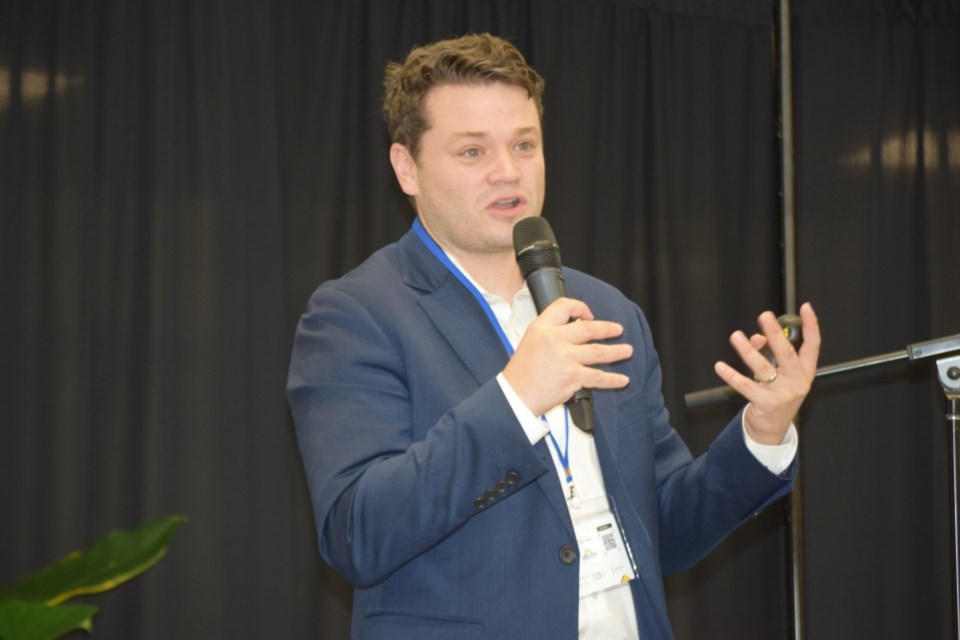ESTEVAN - The delegates who attended the Innovation Conference for Economic Development (ICED) in Rural Areas were able to hear the story of one small community's ability to overcome challenges and grow.
Aaron Pilkington, a Republican who is in his fourth term in the Arkansas House of Representatives, spoke on Sept. 12 at the Southeast College's Estevan campus. Hailing from Clarksville, he reflected on how the town has grown from 7,719 people, according to the 2000 U.S. Census, to an estimated population of 9,743 in 2018.
He pointed out Arkansas is known as a poor, rural southern state, and in the Arkansas Delta River Valley, where Clarksville is located, there were challenges with an under-educated workforce, and a declining and aging population. He told the crowd that to change the culture of a community, people have to start with themselves and do what's necessary.
Pilkington said the efforts in Clarksville started with building up the workforce in the schools and community college. Starting with high school sophomores, students were encouraged to get certification each year so they would have three when they graduated. Industries are located in the area, but employers need people who could do the work.
"Train them, and also show them how much money they can make," said Pilkington. "For a 14-year-old, if you told them they could make x amount of money without having to go to four years of college and taking out all of that debt, it was a really attractive program."
Businesses stepped forward with equipment donations for the students, and community colleges also came on board.
There has been a greater focus on science, technology, engineering and math in education, he said, and the Arkansas government has increased teacher salaries and funding for education. Health-care facilities have academies within them so they can provide on-the-job training.
Hiring institutions have worked on data centres and renewable energy programs. Clarksville was one of the first broadband cities in the state. It owns its own utilities and the community does a lot of progressive things.
"All of these things came about because we were training our workforce, and now with the data centre, we are training them, and even before it is built, we're working with our local university so they have programs," he said.
When the data centre is built in two years, people will be ready to work.
The town has worked hard to improve and rebuild various community hubs. It went through a downtown revitalization project, and built a stage downtown for family nights and concerts.
"One of the things when we're recruiting new physicians and we're recruiting other people, we want to make sure we bring them by there, come in and see that life happening," said Pilkington.
If you go to Clarksville on a Friday night, it's a destination with bars, an entertainment district and things happening because investments were made into community hubs, he said. When people move to town, they want to know what their kids can do, too.
Clarksville might not be able to bring in a big-name act for a concert, but they can have a bluegrass band that offers people something to do while spending time downtown.
Arkansas is also known for being overly regulated, but in Clarksville, they want to get people to work. It means fewer restrictions for licences, less red tape and promotion of downtowns.
They have also encouraged people to share their "pain points" – the issues that create challenges for development. These could be the lack of third-party services or the size of the town's airport.
They also asked former residents why they left, and promoted the town's advantages, such as affordable childcare and real estate.
"How do we sell ourselves to other communities, and how do we also say … how great it is to live here?" he said.
They also looked at how they can meet childcare needs because it is a big seller for people moving there. It's so expensive in other states that it's more affordable for many women to stay home and not return to the workforce.
Pilkinton said Clarksville is now in the "What's next" phase. The community has a progressive new mayor, a young economic development officer and more. Now the challenge has shifted to keeping up with the demand because of interest in the area it tries to become a jewel of the Delta River Valley.





